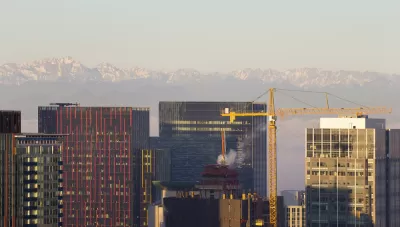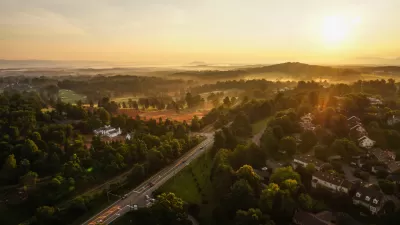The city of Seattle will have an updated comprehensive plan by the end of 2024, with zoning changes to follow by 2025.

The Seattle Office of Planning and Community Development (OPCD) recently unveiled rezoning concepts for the 2024 “One Seattle Plan” comprehensive plan update, according to an article by Doug Trumm for the Urbanist.
OPCD is soliciting public feedback through July 25 on the proposed zoning changes for the One Seattle Plan, and will release a Draft Environmental Impact Statement (EIS) for the comprehensive plan by April 2023. Rico Quirindongo, acting director of OPCD, is quoted in the article saying that public feedback is essential to ensuring that the proposed rezoning concepts provide “the right range of options for where we encourage new housing and jobs in Seattle.”
Trumm identifies the “Combined” Alternative 5 as the most promising rezoning concept from an urbanism perspective:
For urbanists, the “Combined” Alternative 5 emerges as a clear favorite as it combines a “missing middle” gentle density approach in Neighborhood Residential zones with more focused zoning changes on transit corridors and in expanded urban village boundaries, allowing for the best of both worlds. Alternative 5 would best encourage housing growth, promote a diversity of housing choices, while also pulling in more affordable housing contributions via the Mandatory Housing Affordability (MHA) program, which does not currently apply to development in Neighborhood Residential zones, which is predominantly single-family detached homes.
According to Trumm, the other rezoning concepts are 1) No Action, 2) Focused, 3) Broad, and 4) Corridor. A matrix of these conceptual alternatives is included in the source article below. Trumm includes recommendations for how alternatives 2, 3, 4, and 5 can be improved to better meet the needs of Seattle in the future.
“Seattle’s last major Comprehensive Plan update in 2015 aimed to accommodate 120,000 new residents over 20 years,” explains Trumm for context on the pressure to get set the right targets and provide the right tools with the current update of the plan. “In 2015, The Urbanist editorial board pushed the city to go bigger by expanding and adding more urban villages, but the City stuck with the more modest changes it had planned. Seattle ended up adding about 130,000 residents between 2010 and 2020 alone, according to census figures, which suggests the previous growth target was set too low.”
FULL STORY: Seattle Reveals Rezoning Concepts and Invites Scoping Comments for Big 2024 Update

Planetizen Federal Action Tracker
A weekly monitor of how Trump’s orders and actions are impacting planners and planning in America.

Restaurant Patios Were a Pandemic Win — Why Were They so Hard to Keep?
Social distancing requirements and changes in travel patterns prompted cities to pilot new uses for street and sidewalk space. Then it got complicated.

Maui's Vacation Rental Debate Turns Ugly
Verbal attacks, misinformation campaigns and fistfights plague a high-stakes debate to convert thousands of vacation rentals into long-term housing.

In California Battle of Housing vs. Environment, Housing Just Won
A new state law significantly limits the power of CEQA, an environmental review law that served as a powerful tool for blocking new development.

Boulder Eliminates Parking Minimums Citywide
Officials estimate the cost of building a single underground parking space at up to $100,000.

Orange County, Florida Adopts Largest US “Sprawl Repair” Code
The ‘Orange Code’ seeks to rectify decades of sprawl-inducing, car-oriented development.
Urban Design for Planners 1: Software Tools
This six-course series explores essential urban design concepts using open source software and equips planners with the tools they need to participate fully in the urban design process.
Planning for Universal Design
Learn the tools for implementing Universal Design in planning regulations.
Heyer Gruel & Associates PA
JM Goldson LLC
Custer County Colorado
City of Camden Redevelopment Agency
City of Astoria
Transportation Research & Education Center (TREC) at Portland State University
Jefferson Parish Government
Camden Redevelopment Agency
City of Claremont




























